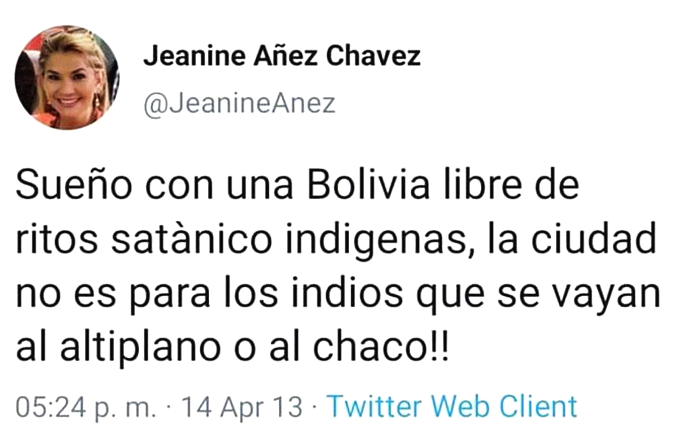“I dream of a Bolivia free of satanic indigenous rites” she tweeted in 2013, “the city is not for the Indians, who should stay in the highlands or the chaco!” Jeanine Áñez, whose white supremacist political party got 4.2% of the vote in Bolivia’s October elections but who then appointed herself president with US backing, excluded her country’s two-thirds indigenous majority from government and issued shoot to kill orders for soldiers and cops dealing with her political foes. A sense of decency in the White House doesn’t mean sending in US troops to arrest her but it does involve the US government shunning her and Latin American politicians like her.
How a progressive Democrat in the Oval Office ought to relate to Latin America
by Eric Jackson
Latin America is not going to be an important 2020 US presidential campaign issue. It will perhaps be mentioned here or there, and may get some special attention among narrow groups like US citizens living in Latin America or US companies doing business in the region.
From the Trump side there will be talk of drugs, gangs, mass migrations and demonized heads of state who don’t follow instructions from Washington, a policy screed that will go heavy on the racism. The discourse of some corporate Democrats will, sadly, be toned down and shorn of the explicit racism but still largely dwell on the same points as the GOP narrative.
In either case, the talking points will be dumbed down for an electorate in which a majority would have heard that there is this canal in Panama but who couldn’t locate Costa Rica or Colombia on a map. Of the minority who are better informed than that, a lot would be stumped by the historical and cultural arguments of whether Panama is more Central American or more South American, as concepts from the past like the Viceroyalty of New Granada, the Captaincy General of Guatemala, the United Provinces of Central America and Gran Colombia would be unknown.
To Americans (in the narrow estadounidiense sense), all of the Western Hemisphere’s land masses south of the Rio Grande and dry specks amidst the waters south of Miami are “our back yard,” even if they hardly know the first thing about the places beyond the US lot lines. It’s what you get in an overwhelmingly unilingual society where, although it is disputed which wit first opined it, “War is God’s way of teaching Americans geography.”
But then, there are a lot of US citizens who live here, or who have lived here, or who have friends or relatives here. And there are those who don’t, but realize that US relations with Latin America are of some economic importance, and affect the intangible but nevertheless important American reputation in the world.
Quite frankly, official US policies toward the region are a wreck right now but have been troubled for a very long time.
As a Berniecrat who also likes Elizabeth Warren while noticing the differences between the two, and who come the fall of next year intends to be working for whoever gets the Democratic nomination, let me lay out a few general principles and specific policies that I would like to see going forward.
What thinking progressives will advocate in this realm is NOT a return to some supposed Golden Age, as things were never all THAT good and in any case so much of what existed a few years ago is now irreparably broken. The only reasonable way to look is forward and that outlook will apply to a great many other things as well.
Some general principles
A. Respect for international law, particularly for the independence, integrity and sovereignty of other countries. As in no invasions, coups, mercenary activities, bribes or economic strangulation aimed at changing the leadership or form of government of any other nation. It doesn’t mean that Americans don’t value and reward democracy and the rule of law. It doesn’t mean that Washington just shrugs in the face of discrimination or other abuses against US citizens. But certain things are not for Washington to decide. Enough of this regime change stuff, especially because so much of what might look so clever and righteous from Washington is actually pretty stupid and leads to doing things that are evil and in any case ineffective.
B. Approximate reciprocity in bilateral relations. When relations have been unequal and dysfunctional, a precise tit for tat can be a bad idea. Better that we have agreements between equals instead of impositions that are resented. Better that causes and effects are predictable for all in US international relations.
The nuts and bolts task
That would be the general rebuilding of the State Department. With that should come a reorientation toward improvement of services to Americans living abroad and to foreigners wishing to do business of many sorts with or in the United States.
The shattering Trump crack-up follows a decades-long bipartisan slide. Services to Americans have been progressively cut back and made more expensive over many years.
Two particular foreign relations cornerstones need to be relegated to history. The “War on Drugs” and the attempt to forcibly reverse the verdict of the Cuban Revolution have both failed at great cost and have long undermined almost every positive aim of US policy in the hemisphere. Meanwhile, Americans living in Panama now have to go to Costa Rica for consular services we used to be able to get here. It’s like that around the world, with short-staffed and underfunded diplomatic outposts dedicated to old failures and now to carrying out Donald Trump’s ill-advised whims.
The budget for diplomacy needs to be restored and then some, but not just to resume full pursuit of fools’ missions. The United States needs a new generation of diplomacy and of diplomats.
In particular
1. Affordable and high quality services for US citizens living in Latin America, starting with the facilitation and inclusion of our votes, ought to be the main task for consulates. Under a progressive presidency the needs and interests of ordinary Americans would not be shoved aside for those of multinational corporations and billionaires.
2. Will the USA adopt Medicare for All? It should. And by a series of bilateral treaties, it should extend this to US citizens living abroad. Done haphazardly it could become an internationalization of Medicare fraud, but from Tri Care and other experiences there is knowledge of how to limit that. So long as health care services in Latin America are cheaper than in the United States, it’s a money saver for Uncle Sam to pay for less expensive services to US citizens in Latin America than to have them come back to the States for these.
3. American business is being run off of the field throughout the region. The main cure for that is not to threaten those Latin Americans who do business with China but to fix the things that make US offers uncompetitive. The high costs of private US health care that US businesses bear, the ever more dominant economic position of hedge funds and other hustlers dedicated to profits from the dismantling of American industry, big tech monopolies that squeeze out or distort innovation and are ever ready to serve foreign powers that do not wish the United States well, a decline in US education that’s felt both at home and abroad, crumbling infrastructures that narrow the possibilities of economic development for so many American communities – the fixing of these problems may be a series of domestic measures, but they are also at the heart of a healthy new foreign policy.
4. It would require some bilateral treaties outside of the International Postal Union and perhaps some subsidies, but in so many countries where postal services are deficient to nonexistent, why not expand American diplomatic mail into a regular postal service for US citizens and allow Latin American countries to use their consulates and embassies for the same purposes? Snail mail may be an antiquated service, but it’s not obsolete. The ideologically driven right-wing movement to destroy the US Postal Service is not only bad news for rural parts of the USA, it’s an impediment for US citizens and American businesses overseas.
5. US cultural and educational influence in Latin America ought to be enhanced. There should be more Fulbright scholarships in both directions. US embassies should be more involved in the presentation and promotion of American performing artists in Latin American venues. The United States should be sending more scientists to the region, and not just to look for oil. America should be done with these right-wing feuds that have pulled the United States out of UNESCO and into educational, scientific and cultural isolation.
6. Is the United States going to save Latin America by teaching its kids to speak English? Why not drop that conceit and boost the fortunes of American business and Americans in general by a US educational policy that all kids in the USA study at least two languages, one of which must be English? Spanish would surely win the competition for the most popular second language, but there are many others, beginning with Brazilian Portuguese, that would be relevant to American business prowess in this region.
7. Many environmental problems, including but not only those flowing from climate change, are global in nature and can’t be properly addressed by the lone efforts of single countries. One example is the rebuilding fisheries of pelagic species that know of no national maritime boundaries. It means creating or restoring marine habitats in both national and international waters, global efforts to get plastics out of the oceans, international law enforcement against illegal fishing, and chains of hatcheries for fish that are not going to stay in one country’s waters. A leading if not a solo US role in this process, across Latin America, the Caribbean and the world, will be vital for the feeding of this planet’s population.
8. War crimes, human rights violations and corruption with impunity are the bane of many countries in the Americas, including the United States. Washington should embrace the jurisdiction of the International Criminal Court in The Hague and stop its intimidation of Latin American countries that would do likewise. US policy should be that the Treaty of Rome should be amended to expand the court’s jurisdiction to include public corruption that has international implications.
9. Domestic racism against Hispanic communities in the USA is toxic both to US foreign relations and to how individual Americans living in Latin America are seen and treated by neighbors. This stuff has to stop, both as a matter of law and of culture.
10. Yes, there are armies and law enforcement agencies for when push gets to armed shove. But a recognition that national security for every nation begins with food and clean drinking water for everybody is essential. Think about the US Army Corps of Engineers, the US Navy Seabees and the US Air Force Red Horse units and you may imagine American military missions to this region that, rather than promote sales for US arms merchants, actually enhance the security of Latin America’s nations. Actually, there is a history of these. As some of these military units get dedicated to domestic infrastructure and disaster relief needs, the White House should have the wisdom and imagination to also send them on prudent missions to our region.
Contact us by email at fund4thepanamanews@gmail.com
These links are interactive — click on the boxes












